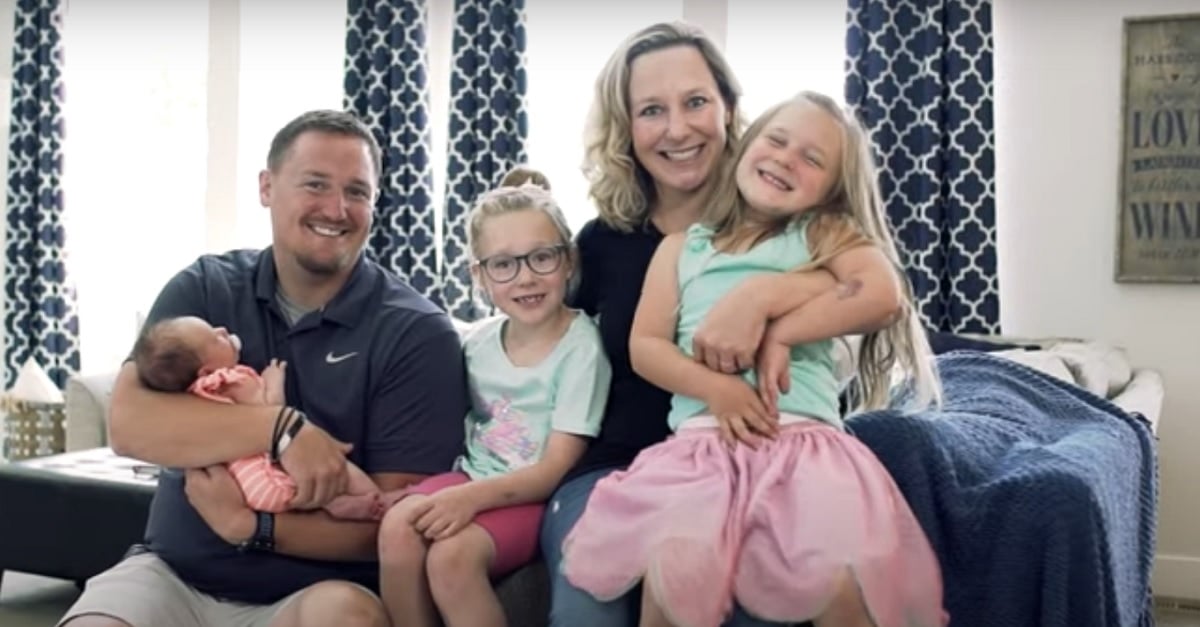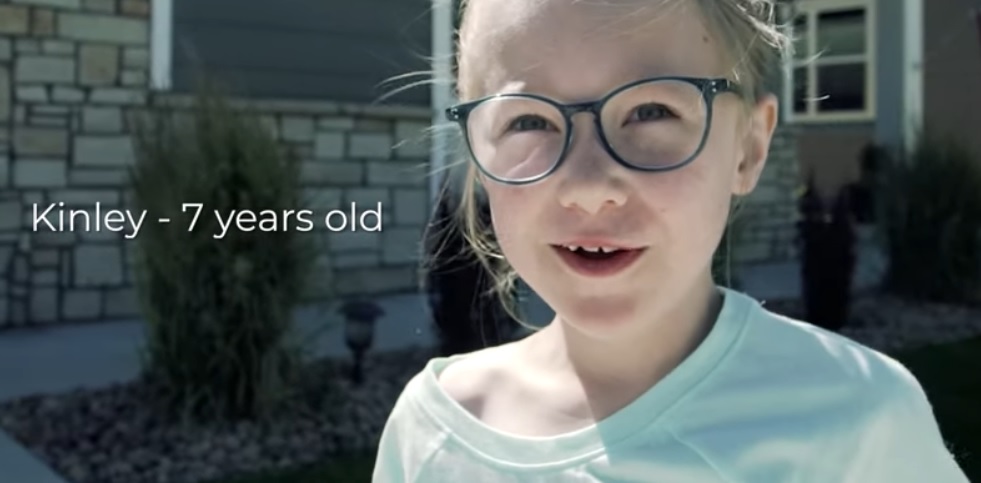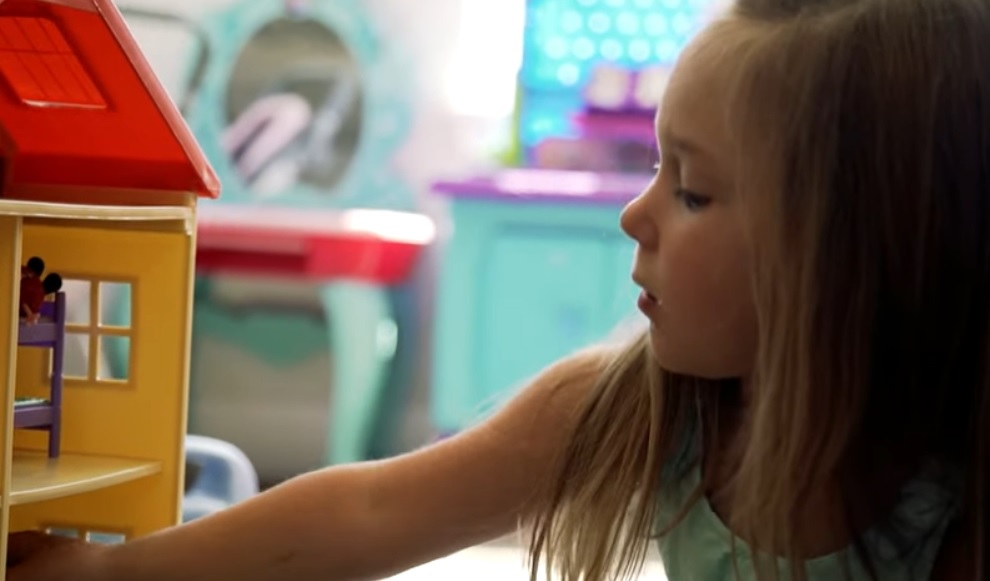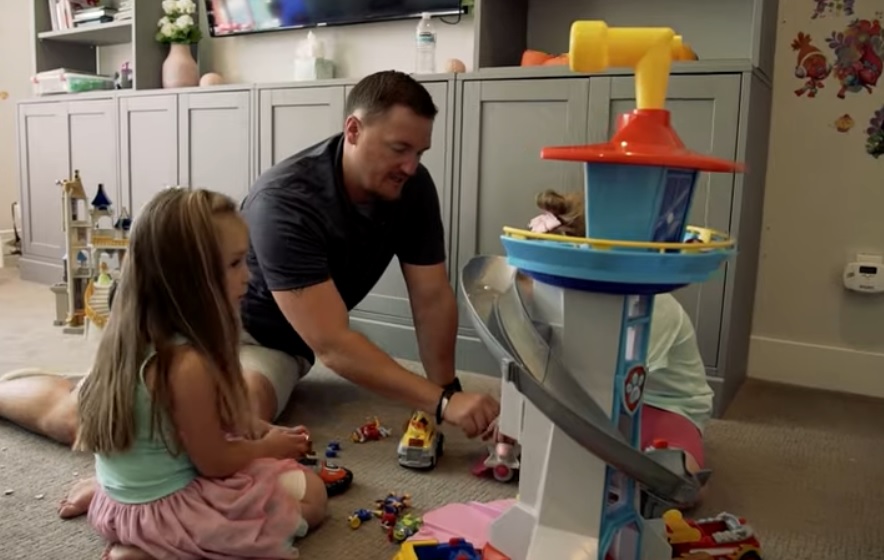
When you have kids, you immediately change — and not just because your schedule is now filled with diapers and playgrounds. You realize the meaning of pure love and acknowledge that you'd do anything to protect your child. That means that every doctor's appointment is often filled with stress, especially if your child is suddenly starting to act differently.
Colorado parents Kyle and Kylie Harrison welcomed their third daughter, Kieran, to the family on June 4. While the occasion was beautiful, their joy was dashed soon after. While Kieran was healthy and happy, they received terrible news about their two other children. Kinley, 7, and Kennedy, 4, were both diagnosed with GM1 gangliosidosis.
GM1 gangliosidosis isn't something you likely know much about, and that's because it's fairly rare. The disease destroys nerve cells located in the brain and spinal cord. While Kinley and Kennedy look fine, they're in the process of deteriorating. And worse, there's currently no cure.
There are three types of gangliosidosis. Classic infantile (type 1) GM1 gangliosidosis is the most severe and can crop up after six months of age. Type 2 is called juvenile GM1 gangliosidosis, and signs begin between the ages of 1 and 5. Adults can also have GM1 gangliosidosis — it's called type 3 and can appear up until the age of 30. Both Kyle and Kylie were unknowingly carriers of the gene. That means that their children had a 25% chance, or 1 in 4, of being affected. Sadly, Kinley and Kennedy fell into that margin.
The signs started when Kinley was just 2. She started having speech and developmental delays. Since those can be pretty common, her doctors didn't seem all that worried at first. At the time, they felt as if some of her issues would be solved by glasses and ear tubes, like many children get.

But the problems got worse. Kyle and Kylie knew that something more serious was going on, and they did all they could to find answers. Unfortunately, with Kinley's diagnosis, there weren't many answers to find aside from the genetic cause. But things got worse when Kennedy also started displaying the same symptoms as her big sister.

"Your mind is going a million miles an hour and then you stop for a second and think, 'Our two kids have a fatal genetic condition and we have this third baby that just got here who might also have it.'" Kyle said to People magazine. That's the one piece of good news — baby Kieran has since been tested and isn't a carrier.
But the fate of her sisters is still grim. Since there's no cure for the disease, there isn't much that can be done right now. But that doesn't mean that Kyle and Kylie aren't trying. "The thing with rare diseases is they are not on everybody's radar so they don't get a lot of attention or funding, and families like ours are left without a whole lot of options," said Kyle. "We are in a complete race against time. Every single day that goes by, we are losing a little bit more of them."
"To be told there is literally not a single treatment for this or anything that they could do is ridiculous. We have to do everything we can to advocate for them so we can hopefully give them a quality of life that they deserve," Kylie added. "We are not going to stop fighting for them."

With the birth of their new baby and everything this year has brought, Kyle and Kylie have had a roller coaster year. They've learned that their two eldest daughters will start deteriorating fairly quickly. "They have a chance of surviving into their teens and early 20s, but it's only a couple of years away that one or both of them will be confined to a wheelchair or on a feeding tube," they told People.
The parents are, unfortunately, very aware of what their reality might look like. The daughters they're interacting with today will be quite different in the months ahead. "At some point, they won't recognize mom and dad when we walk into the room, they won't be able to talk to us, won't be able to say 'I love you' anymore," Kyle stated. "That reality is right around the corner for us, unfortunately."
Right now, Kinley and Kennedy are doing what they can to enjoy their childhood. Both are still verbal, and they're still able to freely play outside without any additional help. While it's good to see, both Kyle and Kylie know that these days are numbered.
"The reality is without the awareness, without the funding, this disease is going to take their lives," Kyle said. "There is no question about it. It's going to rob them of life. You start thinking about all the things that they're going to miss out on and what the reality for our family is going to be over the next several years."
Altogether, the family has tried hard to stay positive, and they're still seeking some sort of treatment for their girls. "We've been telling ourselves that there's a reason that they were sent to us and why they chose us to be their mom and dad," Kyle said. "We are going to give them the time of their life while we can."
Kylie is equally optimistic, choosing to focus on the good times with her daughters that she can have now, as opposed to what things will be like down the road. "You've got to live in the moment and you can't go down those rabbit holes because you'll miss out on what's happening in front of you," she said.

The family is raising money not just for the treatment for their two girls but for parents everywhere. Just because a cure hasn't been found yet doesn't mean it's impossible. Plus, the more research that goes into this disease, the better chance that scientists can really figure it out.
"Kinley, who wants nothing more than to be a doctor, nurse, or vet so she can help other people, will eventually not be able to take care of herself independently," they wrote on their GoFundMe page.
"Kennedy, who loves to dance and sing and dress up, will someday not be able to do her infamous twirls and leaps, or 'freeze' you with her Elsa powers. Each morning, we wake to the reality that we are another day closer to that outcome."
Currently, the family has raised over $200,000 of their $2 million goal. The money is an estimate as to how much it'd cost to put both Kinley and Kennedy through a gene therapy trial. "We refuse to sit idly while our babies bodies slowly betray them," they wrote. "Reaching this goal won't guarantee Kinley and Kennedy treatment, but it will go far in advancing the development of the cures we and families in our position so desperately desire."




